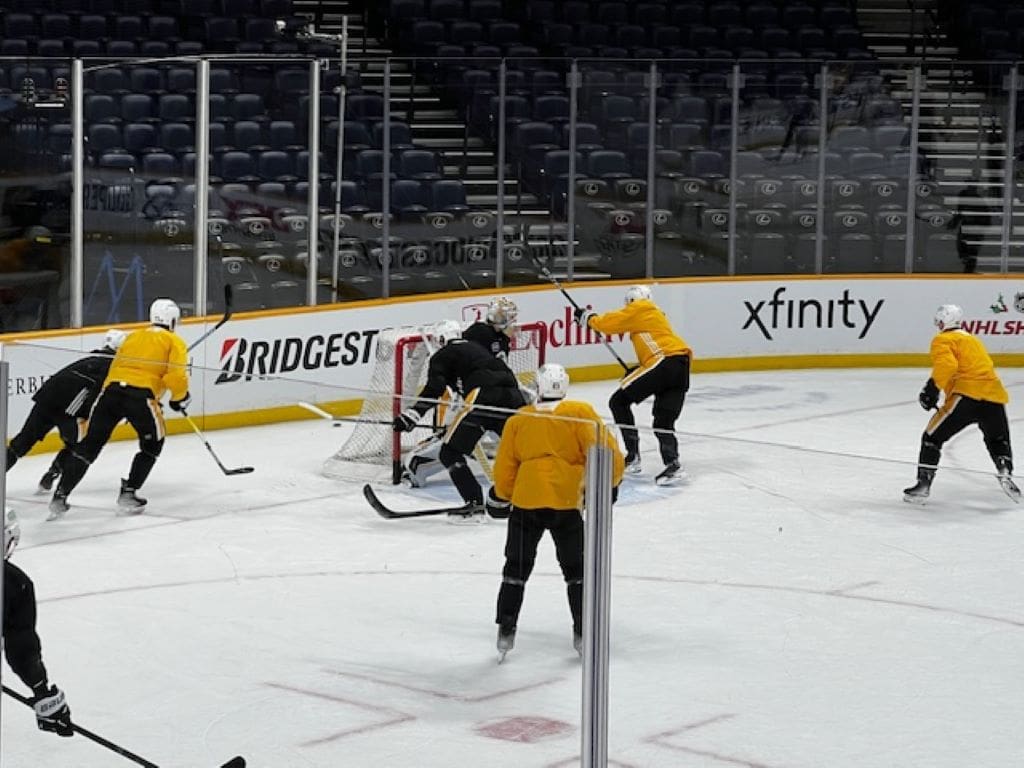Penguins
Here’s a Penguins Power-Play Problem That’s Easy to Overlook

NASHVILLE, Tenn. — The Pittsburgh Penguins devoted the final segment of their 35-minute practice at Bridgestone Arena Wednesday afternoon to getting their power play in order.
Which was pretty much to be expected.
After all, when a team is in a 0-for-20 slump with the man-advantage over an eight-game stretch, the problem has to be addressed.
Coach Mike Sullivan even introduced a personnel tweak, grafting third-line center Lars Eller onto the No. 2 unit, in place of Radim Zohorna.
“Lars is a good player, and he has an offensive dimension to his game,” Sullivan said. “We’re trying to find solutions.”
While Eller might help them to do that, the Penguins have at least one power-play issue that they’re not going to be able to rectify during a workout: They’re not getting nearly enough of them.
Not for a skilled team that prefers to play a skating game, anyway.
Twenty-one games into the season, the Penguins have been awarded just 58 opportunities with the man-advantage, tied for the second-fewest in the league. That works out to an average of 2.76 per game, tying the New York Islanders for the fewest in the NHL.
And that has translated to an average of four minutes, 30 seconds per game with the extra man, less than any club except the Islanders.
Meanwhile, their opponents are averaging 3.14 power plays per game.
If there is an viable explanation for the disparity, the Pittsburgh Penguins don’t seem to have found it.
“I’m not sure I have an answer for you,” Sullivan said. “When you look at the body of work of the team to this point, more often than not, on most nights we have the puck more than we don’t, and our underlying numbers suggest that. Usually, infractions take place on the puck.”
Now, perhaps getting more power plays would serve only to compound the Penguins’ frustration and further shrink their barely-visible-to-the-naked-eye conversion rate of 12.1 percent.
Then again, if they were to be awarded something closer to the league-wide medians of around 3.3 chances and 5 1/2 minutes with the man-advantage per game, perhaps the extra in-game work would expedite getting them out of the rut — or is it a canyon? — in which they’ve been stuck for most of 2023-24.
“Sometimes, it hard to get in a rhythm on the power play when you’re not getting many chances,” Jake Guentzel said. “For some reason, we’ve had to kill a lot of penalties, and we’re not drawing a lot of penalties right now.”
Although the Penguins do not, in general, play a physical style — they place 28th in the league in hits, with 299 to their credit — it’s not as if the officials report to the venue without their whistles when they’re working a Penguins game.
Consider that the Penguins have been shorthanded for five minutes, 19 seconds per game, just a bit below the NHL average.
They also have had fewer power plays than their opponent in more than half of their games — 11 of 21 — heading into their visit to Tampa Thursday at 7:08 p.m. The Penguins have had an edge in power plays in five of the others, while both clubs have had the same number in the rest.
One thing that could begin to tilt the numbers more in the Penguins’ favor would be for them to drive to the net more often and aggressively than they have so far,
“We get there, but I think we’ve got to force teams to have to defend that area more consistently,” Sullivan said. “Then maybe we could draw some penalties or create scoring opportunities.”
That’s a fair point, but it remains that the Pittsburgh Penguins logically should, in general, be getting more power plays than most of the teams they face.
“For the most part, we haven’t been chasing games or playing catch-up,” Sidney Crosby said. “We just have to be more disciplined and hope that turns around a little bit. I think we’ve done a pretty good job of generating shots and (offensive-)zone time. I don’t know what our possession time average is, compared to other teams, but we just have to trust that over 82 games, it will even itself out.”












